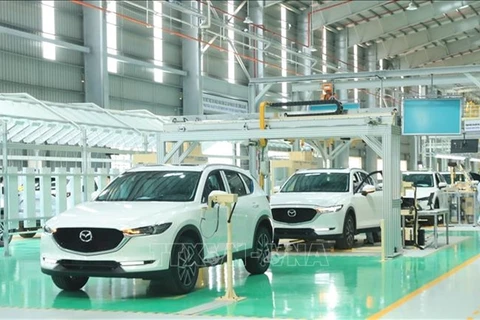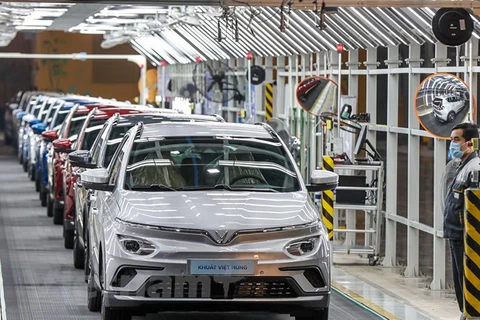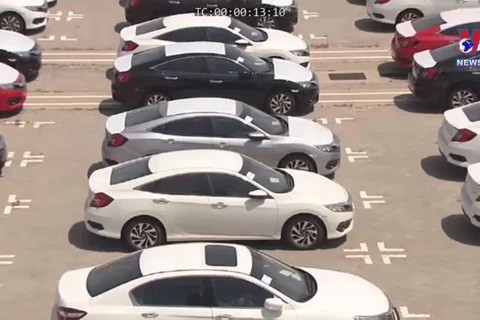Hanoi (VNS/VNA) - The Vietnamese automotive market is expected to rebound this year, returning to its growth track after sluggish sales in 2021, according to industry insiders.
This assessment was based on the continuous increase in sales volume of Vietnamese auto manufacturers and assemblers in the fourth quarter of 2021.
Automobile experts have attributed this growth to the Government’s preferential policies, which are the main drivers for the recovery of the local auto industry in 2022.
In October last year, the Ministry of Finance conducted a draft decree to collect suggestions from ministries and agencies to cut the registration fee on domestically manufactured and assembled cars.
The Decree clearly states that the registration fee rate for domestically manufactured and assembled cars will be 50 percent compared to the previous one, applicable from December 1, 2021, to the end of May 31, 2022.
Most representatives of auto brands in Vietnam expect a recovery in sales in 2022 as the COVID-19 pandemic seems to be under control.
Analysts from VNDirect Securities JSC expect that the Government's reduction on registration fees will help the domestic auto industry to recover in 2022.
Besides, listed auto companies experienced strong growth in the first half of last year thanks to the launch of many new models and promotional policies to attract customers. However, their net profit in the third quarter of 2021 was still hit hard by the pandemic.
The pandemic outbreak in the third quarter last year forced many cities and provinces to apply social distancing measures. The Vietnam Automobile Manufacturers Association (VAMA) estimates that more than 200 auto dealers had to close in August and September 2021.
But the domestic auto market rebounded later on. The VAMA said that in October 2021, some 29,797 cars were sold, an increase of 120 percent compared to September 2021.
The VAMA announced that the total market sales of its member units reached 38,656 vehicles in November 2021. The sales of passenger, commercial and special-purpose vehicles expanded by 40 percent, 8 percent and 39 percent, respectively, compared to the previous month.
VAMA's member units had total sales of 257,390 vehicles in the first 11 months of 2021, up 3 percent over the same period last year.
With 50 percent reduction in the registration fee, which came into effect in December 2021 have also helped push up sales.
VAMA’s members sold 43,526 units in December alone, the highest last year. December was the fourth month in a row that auto sales rose.
The growth came as the pandemic was under control, social distancing measures in many provinces and cities across the country were lifted and there was a 50 percent reduction of registration fees for cars manufactured and assembled in Vietnam applied from early December 2021.
In addition, VinFast, the Vietnamese automaker, has begun delivering its first battery-electric SUV - the VF-34 - to customers in its home market. The company already offers a full line of conventional automobiles in Asia.
The company has also announced its first fleet customer to buy electric cars. Artemis DNA, a biotech company dealing in genetics, has reserved 100 EVs from VinFast and expects delivery in late 2022 when VinFast will turn into an all-electric car manufacturer.
Experts believe that VinFast's electric cars will create a new trend for the Vietnamese auto market in 2022-2023 when other EV models are expected to launch in the Vietnamese market in the first half of 2022 such as the Kia EV6, Mercedes Benz EQB, Mercedes Benz EQE and Mercedes Benz EQS.
However, they have shown their concern that the development of the pandemic could have a direct effect on the performance of listed auto companies./.
This assessment was based on the continuous increase in sales volume of Vietnamese auto manufacturers and assemblers in the fourth quarter of 2021.
Automobile experts have attributed this growth to the Government’s preferential policies, which are the main drivers for the recovery of the local auto industry in 2022.
In October last year, the Ministry of Finance conducted a draft decree to collect suggestions from ministries and agencies to cut the registration fee on domestically manufactured and assembled cars.
The Decree clearly states that the registration fee rate for domestically manufactured and assembled cars will be 50 percent compared to the previous one, applicable from December 1, 2021, to the end of May 31, 2022.
Most representatives of auto brands in Vietnam expect a recovery in sales in 2022 as the COVID-19 pandemic seems to be under control.
Analysts from VNDirect Securities JSC expect that the Government's reduction on registration fees will help the domestic auto industry to recover in 2022.
Besides, listed auto companies experienced strong growth in the first half of last year thanks to the launch of many new models and promotional policies to attract customers. However, their net profit in the third quarter of 2021 was still hit hard by the pandemic.
The pandemic outbreak in the third quarter last year forced many cities and provinces to apply social distancing measures. The Vietnam Automobile Manufacturers Association (VAMA) estimates that more than 200 auto dealers had to close in August and September 2021.
But the domestic auto market rebounded later on. The VAMA said that in October 2021, some 29,797 cars were sold, an increase of 120 percent compared to September 2021.
The VAMA announced that the total market sales of its member units reached 38,656 vehicles in November 2021. The sales of passenger, commercial and special-purpose vehicles expanded by 40 percent, 8 percent and 39 percent, respectively, compared to the previous month.
VAMA's member units had total sales of 257,390 vehicles in the first 11 months of 2021, up 3 percent over the same period last year.
With 50 percent reduction in the registration fee, which came into effect in December 2021 have also helped push up sales.
VAMA’s members sold 43,526 units in December alone, the highest last year. December was the fourth month in a row that auto sales rose.
The growth came as the pandemic was under control, social distancing measures in many provinces and cities across the country were lifted and there was a 50 percent reduction of registration fees for cars manufactured and assembled in Vietnam applied from early December 2021.
In addition, VinFast, the Vietnamese automaker, has begun delivering its first battery-electric SUV - the VF-34 - to customers in its home market. The company already offers a full line of conventional automobiles in Asia.
The company has also announced its first fleet customer to buy electric cars. Artemis DNA, a biotech company dealing in genetics, has reserved 100 EVs from VinFast and expects delivery in late 2022 when VinFast will turn into an all-electric car manufacturer.
Experts believe that VinFast's electric cars will create a new trend for the Vietnamese auto market in 2022-2023 when other EV models are expected to launch in the Vietnamese market in the first half of 2022 such as the Kia EV6, Mercedes Benz EQB, Mercedes Benz EQE and Mercedes Benz EQS.
However, they have shown their concern that the development of the pandemic could have a direct effect on the performance of listed auto companies./.
VNA
























